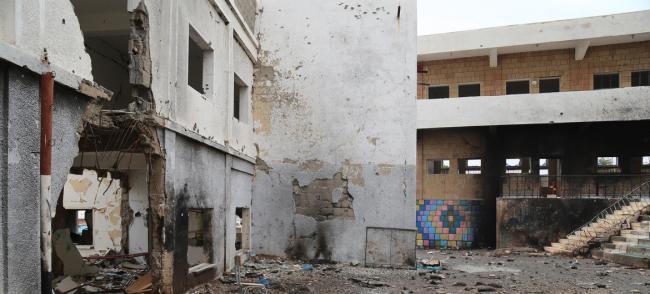
As Yemen conflict rages, ‘all too abundantly clear’ millions of civilians are the ones losing – UN relief chief
New York, Sept 22 (IBNS): Raising the alarm over the rapidly deteriorating humanitarian situation in Yemen, the top United Nations relief official on Friday underscored the need for all parties to avoid further military activity around Hudaydah port – the vital lifeline through which food and fuel flows into the war-torn country.
“It is far from clear that the recent intensification of fighting is producing any winners,” Mark Lowcock, the UN Emergency Relief Coordinator, told the Security Council on Friday.
“It is, though, abundantly clear, all too abundantly clear, who the losers are: millions of Yemenis civilians, most of them women and children, whose lives are right on the line.”
Bleak humanitarian situation
Across Yemen – which was already among the world’s poorest countries before fighting erupted in 2015 – well over three-quarters of the population is in need of humanitarian assistance; some 18 million people, including women and children are food insecure, eight million of them severely-food insecure; millions of families have are without a source of income, with teachers, health and sanitation workers and public servants not paid any wages in two years.
Challenges are further compounded by wave after wave of cholera outbreaks and fighting that has not only claimed civilian lives, but also severely hampered delivery of life-saving aid.
Despite heavy odds, work of brave humanitarians on the ground and the support of the international donor community had been successful in keeping the situation “stable” and avoiding the “worst loss” of life, said Lowock.
Aid operation could be overwhelmed
However, two recent developments are now threatening to “overwhelm the aid operation”, he warned.
“The first is a marked economic deterioration, symptomized by the depreciation of the Yemeni Rial by some 30 per cent in the last month or so,” said Mr. Lowcock, who is also the UN Under-Secretary-General for Humanitarian Affairs.
“We are already seeing pockets of famine-like-conditions – including cases where people are eating leaves because they have no other form of sustenance.”Because almost all the food consumed in Yemen is imported, that depreciation translates directly into a sharp increase in the price of food, who are food insecure but who are not reached by the aid operation, he explained.
The second development, continued Lowcock is the intensification of fighting around Hudaydah, choking the vital port which the aid operation and the commercial markets depend on.
Heading off an impeding catastrophe
In his briefing, Lowcock underscored that while humanitarian action can be scaled up, relief organizations “simply cannot look after the needs of all 29 million Yemenis.”
“That is untenable,” he stressed, asking the Security Council for support in “three key areas” to prevent a complete collapse.
The areas, he outlined, are:
Immediate measures to stabilize the economy and support the exchange rate;
Everyone with a stake in the conflict to uphold their obligations to protect civilians and civilian infrastructure, facilitate aid access to vulnerable people; and
All parties to find practical solutions to key issues, including ways civilians in need of medical treatment can travel outside the country to receive it.
“And, of course, and finally, the parties need to get around the negotiating table and engage seriously with the efforts of the Secretary-General’s Special Envoy [Martin Griffiths] on a positive path towards peace,” he concluded.
UNICEF/Basha
Support Our Journalism
We cannot do without you.. your contribution supports unbiased journalism
IBNS is not driven by any ism- not wokeism, not racism, not skewed secularism, not hyper right-wing or left liberal ideals, nor by any hardline religious beliefs or hyper nationalism. We want to serve you good old objective news, as they are. We do not judge or preach. We let people decide for themselves. We only try to present factual and well-sourced news.







